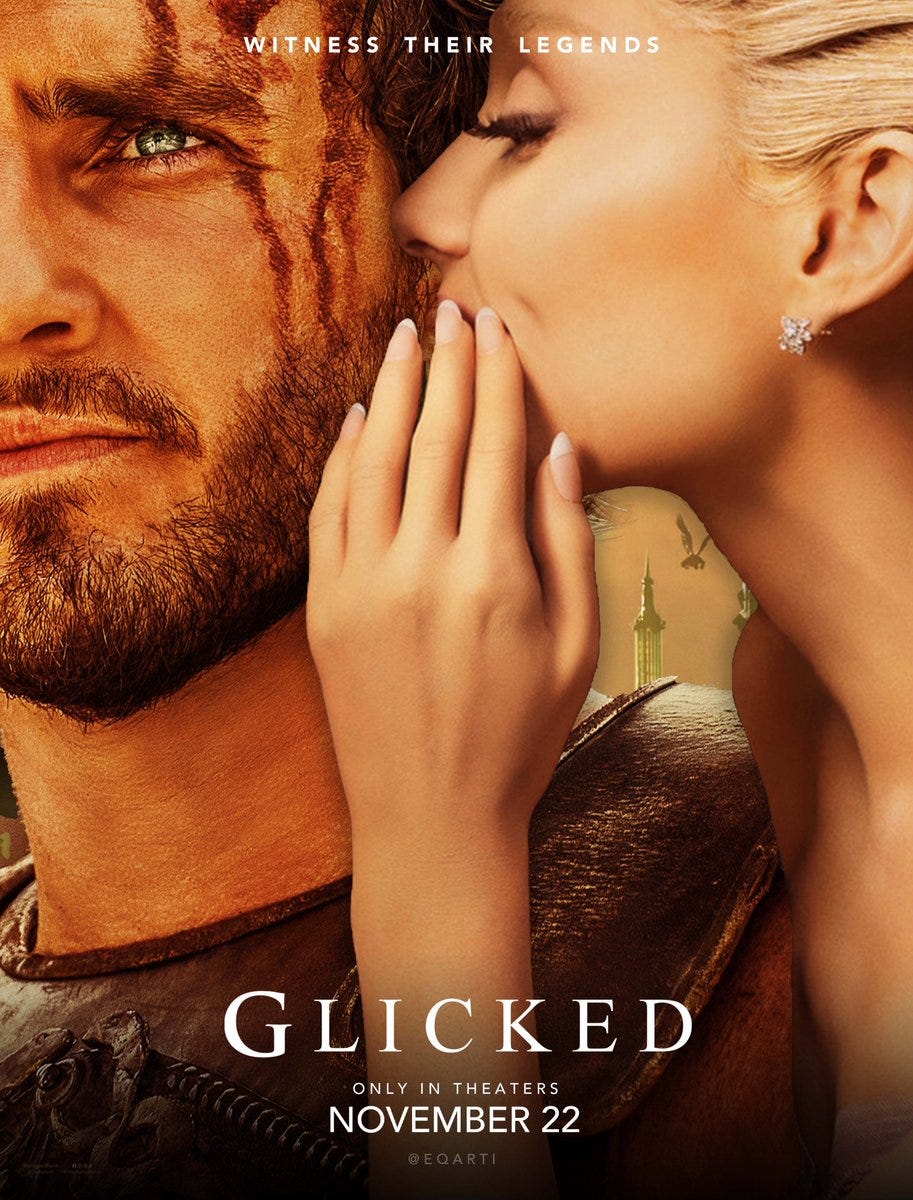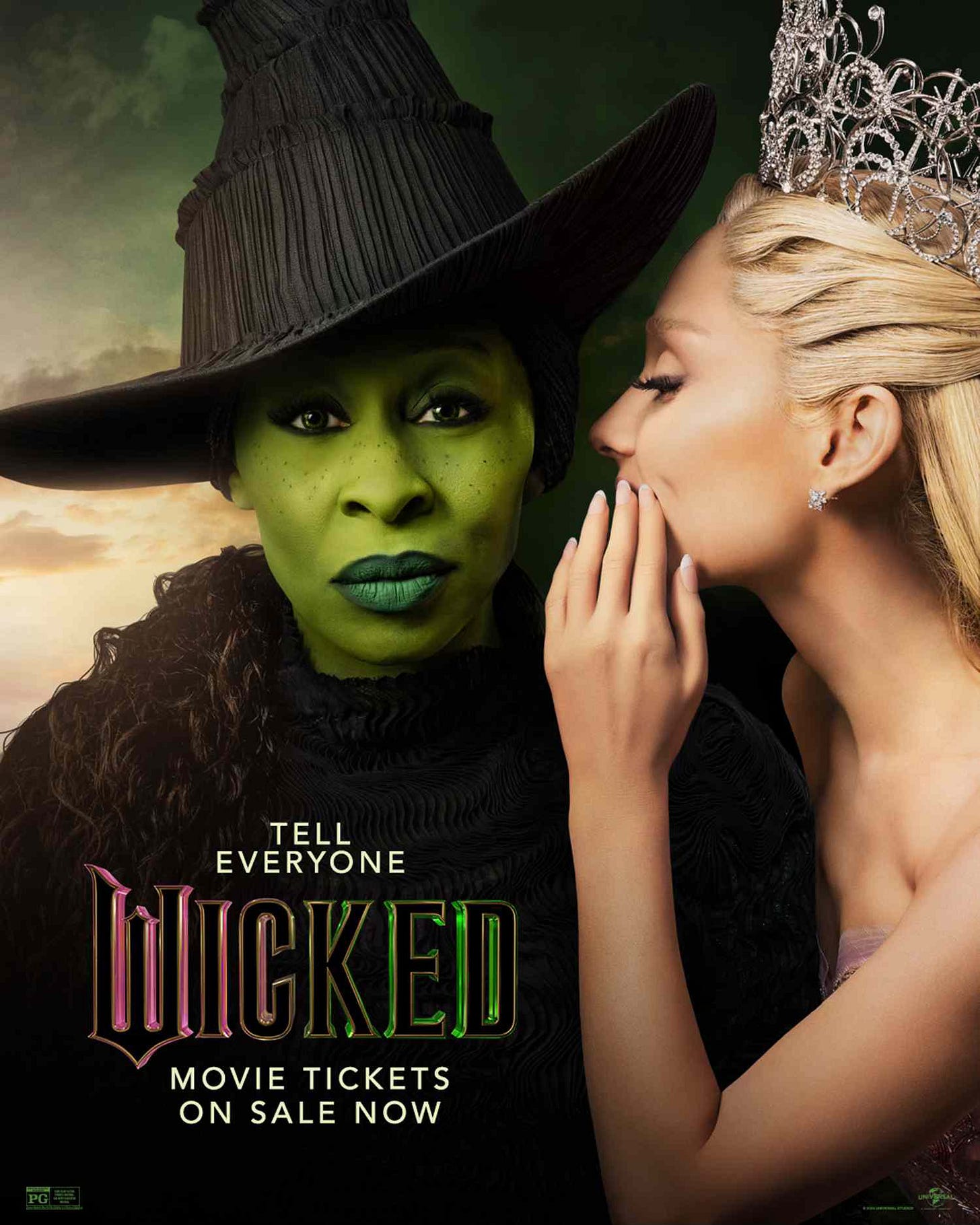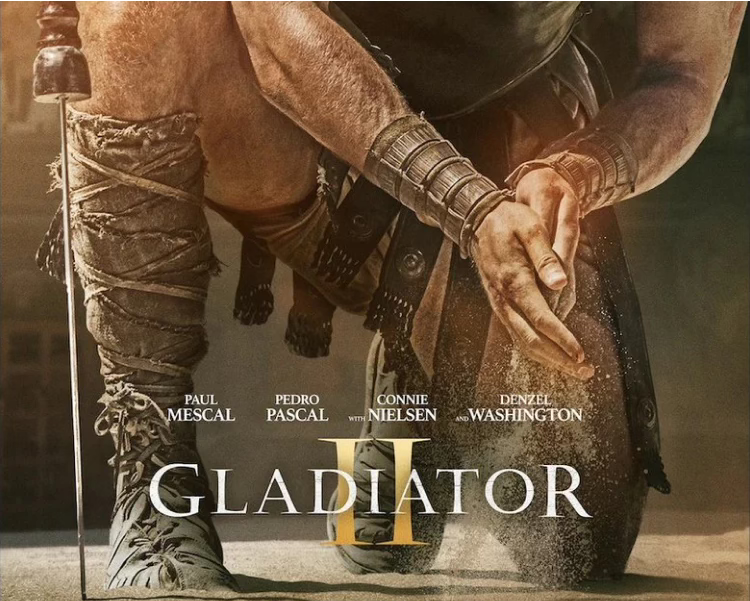Glicked
a very silly review of my first double feature
Yesterday, I embarked on a cinematic journey like none I’d ever taken before. I don’t go to the movie theater often, but I do appreciate it as one of the few places in modern life where you have to fully devote your attention to one thing that overwhelms all sight and sound, no phones allowed. Of course, that can be torture if the movie is bad, but it can be an incredible break when it’s good. I find myself craving moments where I genuinely have to separate from my devices. I couldn’t imagine prior to last week, though, that I would ever sign up to spend over seven hours in a movie theater, but that’s exactly what Cassie and I did on Saturday.
We each propelled a half of Glicked. She loves musicals and had just seen the stage production in London. I wanted to see Paul Mescal’s new movie. Since our tiny hometown theater had cleared the slate of movie options offer the most showings possible of the two movies, we embarked on a double feature journey. It’s off season; there’s nothing better to do. Here’s my thoughts on Wicked, Gladiator, and the Glicked experience.
Wicked
I’d seen Wicked on Broadway as a child after becoming obsessed with the program my grandma brought back from her New York trip where she saw the musical. Then, as a young teen, I had a musical theater phase (or more precisely a Glee phase) where I listened to the cast album enough times that I surprised myself by knowing the words to all the songs (no, I’m not a monster, I did not sing along). It was an interesting experience remembering none of the plot but having a good grasp of the songs and their order, taking guesses at how it would all fill in.
I’m honestly undecided on if Wicked is a good movie or if the Wicked musical is just such a good story that it would be incredible no matter how you went about adapting it. I found myself yearning to see the show confined to a stage again. The expansiveness of a movie world didn’t add anything for me, perhaps because of how it was designed. I’m not a big CGI fan, and its application here just felt so over-the-top. I know it’s a movie so they’re going to use as many technological tricks as they can, but I found myself yearning for the animals in the movie like Dr. Dillamond to be depicted more like they were in the musical with humans in elaborate costuming. There was something that felt both too fake and not fake enough about the additions to the world from the rendering of the cities to the flying monkeys. They didn’t go to a full fantasy extreme, but they were also too heavy handed to give it the grounding that the theater staging offers.
Still, it’s a good movie. A good story will always produce an, at least, a decent movie, and the casting pleasantly surprised me, elevating the experience. I’ve been excited about a Wicked movie since the rumors started swirling years and years ago, but I really did not love the casting choices on paper. It dimmed my enthusiasm for the movie. And then seeing the clip of “Popular” on Twitter that came out before the movie made me even more skeptical. (It’s still my least favorite number in the film and the only musical performance that didn’t land for me.) But I get it now. Ariana Grande rises to the occasion, embodying Glinda well enough that I forgot it was Ariana on the screen. I found it funny and endearing how she seemed to mimic Kristen Chenoweth’s accent at times. Jonathan Bailey, who I wasn’t familiar with before this, was as incredible as Twitter promised. The cameos were a fun nod to the actresses that originated Glinda and Elphaba on Broadway. The only casting that really fell flat for me was, surprisingly, Bowen Yang who is one of the more redeeming parts of SNL but didn’t feel like the right fit in Wicked.
I guess Cynthia Erivo gets the real flowers, though, because I cried during the movie three times, all during Elphaba’s scenes. This is, at least in some part, owing to the fact that I’ve always related to Elphaba, but I imagine it’s her performance that did push me to actual public tears. I think the only other movie I’ve cried for is Titanic, also in public on a plane. “I’m Not That Girl” broke me first. Then the hope in her and Glinda’s exchange about moving to the Emerald City together one day. Finally, in the extremely stretched out performance of “Defying Gravity.”
Speaking of stretched, I asked Cassie afterwards, since she’d recently seen the musical, what about the movie made Part 1 as long as the entire live show. We decided it was mostly down to the techniques that movies use to elicit emotion that theater simply can’t. Long, lingering moments without a camera to focus attention on a look or a hand don’t work when someone’s in the nosebleeds. So it mostly seemed like the movie simply took more time throwing emphasis, building the world, and milking the musical moments for everything they were worth. It works. I have a tendency to get impatient during movies, and I honestly thought an almost three hour long movie might be a new form of very frivolous torture, but I was thoroughly entertained. We were both surprised at how fast the time passed.
The movie reminded me why I’ve always loved the musical, and I’d say that’s a marker of success for a project that has to live up to something so iconic.
The sub-plots I’d forgotten in the decade since I’d seen the musical also surprised me as sharply relevant. Oz is trying to cage its animal population to suppress their voices, especially in high ranking positions like the professorship that Dr. Dillamond holds. Part of what ends up defining Elphaba is her quest to save the animals, because she knows what it’s like to be different and to be treated horribly for it. It’s hard not to make parallels with our own world. The wizard is ultimately a fraud with no powers, hiding behind a guard of monkeys and a mechanical floating head. Elphaba is made out to be evil when she breaks with Oz’s directives. And Glinda gets to live on as the Good Witch for remaining complicit to the system. I’ve always liked Wicked for recasting the so-called villain in a new more complex light where she gets to be a hero. But it’s also a good reminder of how quickly stories can get twisted to suit those who are in power.
Cassie was surprised that this installment was simply Part 1. When we went outside between showings, none of the posters make this evident. I’d been forewarned online, but I guess it’s a crafty marketing move to not make that explicitly clear, lest they turn off the people who won’t consume a series until it’s complete. The trouble is, the most iconic bits of Wicked from “Popular” to “Defying Gravity” are in Part 1. And, in a way, Elphaba flying into the sky and departing an Oz in shambles could be the end of the story, a compelling enough final image. I have to wonder if everyone who buys a ticket to Part 1 will return to theaters in a year for Part 2.
As a final note, our theater was full of little-little kids. This might be partly owing to the fact that this was the only PG offering on a very dreary Saturday, but I found some dissonance in this. Wicked has nothing objectionable in a way that would garner it a higher rating, but at the same time, it’s most definitely not a kids’ movie. Kids can absolutely enjoy it, especially older ones, but this movie in no way caters to a young audience.
Gladiator
We hung out in the basically empty theater for the hour between showings. We bought popcorn and candy and ate it before the movie started in the deserted theater where the lights were on and the screen was off. We talked Wicked and speculated about Gladiator. I had Sour Patch Watermelons, which are a total guilty pleasure.
Then the previews started, intense and gory, making it very clear that we were entering a very different universe. The Bob Dylan biopic trailer was a welcome respite. Then Pedro Pascal, Joseph Quinn, and Paul Mescal appeared on the screen. Paul thanked me for watching the movie in a theater, as intended, and I wondered why they don’t film a bit like that for all theater movies. It was a nice touch.
I had zero expectations for Gladiator. Unlike Wicked, the casting was the one thing I was on board with. They picked the most dazzling male actors with appeal across generations and fandoms. It was the casting that drew me to this movie that I would’ve absolutely ignored otherwise. Having little knowledge of what the film would entail besides a life-sized build of the Colosseum and gladiators, I was along for the ride, actively having to work to figure out what was going on.
I see why they picked Paul Mescal for the lead now. I went because of Paul Mescal, but I will admit that I didn’t totally see how Ridley Scott apparently watched Normal People and saw his portrayal of Connell Waldron and thought, “That’s my gladiator.” Not that he isn’t absolutely incredible in Normal People. It’s just not a show that really makes you think of sword fights and brawling. But Lucias is a character of few words, like Connell, sensitive, full of ideals and poetry, and silent sadness. All of which are Paul’s calling cards. As Amelia Dimoldenberg described his typical roles in their Chicken Shop Date episode, sexy sad. I can see why a typical action movie actor might not have actually worked in this role. Lucius experiences an immense amount of loss and has a lot of unspoken complexity, which took me by surprise.
Denzel Washington is, unsurprisingly, as good as Twitter said he was. He does steal the show, but I also feel like, when comparing Denzel’s performance to others in the movie, the internet isn’t considering that his character offered him a lot more range than the gladiators and generals had. He played a character that was vastly different tonally to almost everyone in the movie. That’s bound to stand out. I also thought that the character, Ravi, a retired gladiator turned doctor to the gladiators, stood out and was an important emotional anchor to the film, offering Lucius a rare opportunity to be soft. Pedro Pascal did a great job as the stoic general and Joseph Quinn and Fred Hechinger played the twin emperors with a wild commitment to absurdity.
Speaking of the absurd emperors who are destroying Rome for their own vanity, after watching the news for the last week, seeing Hechinger’s character appoint his pet monkey as his lead council felt all too real.
There are some haunting scenes here, particularly in the recurring image where Lucius flashes to the River Styx in his near-death moments. While I knew that Lucius had to survive each battle to continue having a film, he’s really never given a break in any other respect. There were more tragic, emotional turns than I expected.
And, while I knew there would be fight scenes and gore, I didn’t quite understand how gratuitous the violence would be from gushing blood to decapitation and sliced limbs. Nothing is cut away from. I guess this intensity should be expected from an R rated movie that earned this designation for violence alone. I could’ve honestly done with less, but I also know I’m not the target demographic for the film by the number of men my dad’s age that surrounded us in the theater.
I also thought some of the CGI moments here were ridiculous, particularly the monkey-like things that Lucius fights in his first Coliseum battle. It seriously looks like he spawned into a video game to fight strange, mythical computer creatures. While there were plenty of moments that made me want to google the historical accuracy of the film out of curiosity, the CGI monkeys were the only thing that majorly pulled me out of the movie. I did end up googling the flooding of the Coliseum for sea battles, which I’d vaguely recalled hearing about before. I still want to find out if they did wear somewhat romper-like outfits then or if that was just a costuming convenience.
While the fight scenes will get your heart rate up, the real tension comes in the intersecting threads of the main characters not knowing the big picture, unable to see that they’re all largely working towards the same objectives. As a viewer, you’re left to wonder if they’ll be able to come to this understanding before it’s too late. The lingering message of the movie from its closing image seems to be a contemplation of how heaps of loss can accompany a major victory. While we don’t really get to see how Lucius squares that, it’s clear that winning doesn’t heal all.
I was surprised how much I liked the movie despite having a few squeamish moments. It definitely helped that I had a major phase of being fascinated by the Romans as a kid, and now I want to read more about the topic again to see where the film took liberties and where it stayed true to some kind of history.
I’ll end the Gladiator section with my favorite bit of the Gladiator press tour, where Paul talks about learning to ride horses for the film. It was cool to have seen this clip and then watch the sequence in the context of the film.

Glicked Takeaways
Just like Barbie and Oppenheimer were a tonal odd-couple, this is definitely an awkward mash-up. I went in wanting to see if there was something more you could glean from watching these two very different movies in conjunction, so my brain spent a lot of time reaching for parallels. I’d say this is a double feature that menu that mostly appeals directly to me—someone with a history with musicals and an interest in the cast of Gladiator. I couldn’t really picture the people who surrounded me in either theater getting up to switch movies, and Cassie and I were the only two people doing it at our showing.
Here’s the united narrative I landed on: Both movies are stories of outsiders taking down (or trying to) a corrupt and failing government. In Wicked, the corruption is better hidden, leading to only characters like Dr. Dillamond, who is directly affected by it, and later Elphaba, noticing. It’s a quieter kind of resistance, and since the movie ends right as Elphaba comes to realize the gravity of the governmental failure, we don’t get to see whether she will succeed in her quest. Gladiator features a boy who was cast out from his destiny and is forced into reclaiming it against the backdrop of a failing empire. In this movie, everyone from the citizens to the star general knows the emperors are incapable and bleeding the city dry, but they have to figure out how to stop two people who have been given unlimited power and protection. Lucius and Elphaba can both envision better, more just societies, and they genuinely believe these dreams are possible.
Another strange commonality is that both movies aren’t super upfront about their structural oddities. Wicked doesn’t make it abundantly clear that you’re going to see Wicked Part 1. You’re simply seeing Wicked until the tiny Part 1 comes up on the title screen a good way into the film and then the To Be Continued… flashes at the end. Gladiator leaves it fairly ambiguous in their press and marketing as to whether it’s a remake or a sequel or what’s happening unless you’re really paying attention. It’s obviously connected to the movie from twenty years ago. The 2 in Gladiator 2 is only shown in the stylized II in GladIIator, symbolizing the roman numeral for 2. Here, it’s less of an issue because they provide all the background from the first movie you’d need, but it’s funny nonetheless. Both movies are highly aware of not spooking the audience with perceived complication.
Also, I either really hate CGI (Which is probably true? Most of the movies and TV shows that I gravitate towards typically don’t include it) or it’s just not done well in either movie in certain aspects. I’m not sure how either director looked at their final product in that respect and was like, “Yes, this is what I really want.” Especially those Gladiator monkeys.
Finally, I’ll say both were worth watching. I don’t think I got anything out of the double feature beyond only having to go to the movie theater once, but I’m glad I’ve seen them both. I have a pretty high bar for feeling a movie theater trip was worth it, but I’ll give this one a stamp of approval.
Have you seen Wicked or Gladiator? Have you given into Glicked like I did? Let me know!



